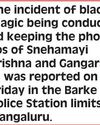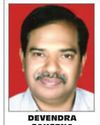
This statement of John Stuart Mill brings to light a remarkable phenomenon, though uncommon, called 'dissent', i.e., 'to differ in opinion or feelings' or 'to disagree'.
The Constitution of India realizing the essence and significance of dissent made this right available not only to our citizens but to our judges [Article 145].
The ability of a judge to write an opinion which rejects the reasoning of his colleagues and explains how the majority has fallen into error is one of the key indicators of a robust and independent judicial system.
The possibility of dissenting opinions in a multi-member bench in constitutional courts is one factor which provides reassurance that the courts are staffed by independent judges beholden only to their own individual appreciation of the Constitution and the law.
The data collected by the author displays a declining trend in the frequency of dissent over the last seven decades.
In the last two decades velocity of dissent was found at its lowest level; people thus would be inclined to think that democratic elements were lost in the last two decades.
The abysmal rate of dissent in CJI benches allows us to infer with some amount of conviction that either it may be the persona of the Chief Justice of India which restricts indirectly/directly brother judges to express his/her disagreement in the bench or the fact that Chief Justice has a lot of administrative powers vested in him, specifically the power to constitute benches where he is in position to influence his brother/sister judges not to raise a question mark on his judgment or he constitutes benches of like-minded judges where possibility of dissent becomes almost nil.
Justice DY Chandrachud's tenure as apex court judge provides respite where he tried to revive the dissenting culture in the apex court.
This story is from the November 15, 2024 edition of The Statesman.
Start your 7-day Magzter GOLD free trial to access thousands of curated premium stories, and 9,000+ magazines and newspapers.
Already a subscriber ? Sign In
This story is from the November 15, 2024 edition of The Statesman.
Start your 7-day Magzter GOLD free trial to access thousands of curated premium stories, and 9,000+ magazines and newspapers.
Already a subscriber? Sign In

MUDA Case Petitioner Complains to Police About Black Magic Against Him
In an interesting development, Mysuru Urban Development Authority (MUDA) case petitioner Snehmayi Krishna complained to the Mangaluru Police Commissioner Anupam Agarwal on Saturday alleging black magic against him by Chief Minister Siddaramaiah's supporters.
Budget 2025: Significant boost for higher education
Union Finance Minister Nirmala Sitharaman, in her Budget 2025-26 speech, emphasised the government's push for Artificial Intelligence (AI) in education by announcing the establishment of a Centre of Excellence in AI for Education, with a dedicated budget of Rs 500 crore.

Budget lays down 'Viksit Bharat' roadmap
Finance Minister Nirmala Sitharaman on Saturday presented an ambitious and growth-oriented Union Budget, providing major income tax relief to the middle class, boost to agriculture and laying a roadmap for 'Viksit Bharat' by 2047.
Tech Surge
For decades, the prevailing assumption in technology circles has been that the West, led by the United States, enjoys an unassailable dominance in advanced research and innovation.

The strength of feminine tenderness
Despite years of struggle, the persistence of patriarchy is still the sad truth that we all live, and somehow absorb the tiniest of it every day.

Sick and wounded children begin crossing from Gaza to Egypt in first opening in months
Agroup of 50 sick and wounded Palestinian children began crossing to Egypt for treatment through Gaza's Rafah crossing on Saturday, the first opening of the border since Israel captured it nearly nine months ago.
Trump administration fires prosecutors involved in 6 January cases
The Trump administration on Friday fired a group of prosecutors involved in the 6 January criminal cases and demanded the names of FBI agents involved in those same probes so they can possibly be ousted, moves that reflect a White House determination to exert control over federal law enforcement and purge agencies of career employees seen as insufficiently loyal.
No income tax for income up to Rs 12 lakh
In a boost for the middle class, Finance Minister Nirmala Sitharaman, in her Union Budget 2025, unveiled a major overhaul of the new income tax regime, introducing what in effect is a zero-income tax slab for taxpayers earning up to Rs 12 lakh annually.
Middle-Class Relief
The Union Budget 2025-26 delivers a substantial T tax break to India's middle class, with the exemption threshold rising to Rs 12 lakh from Rs 7 lakh.

Return of Oligarchs
Currently, when tax collections, both direct and indirect, and the Government's spending on infrastructure are at record levels, economists are suggesting that further growth of the economy will depend on a rise in consumption levels, and the time may have come for the Government to cut taxes so that people in the lower and middle brackets have more spending power. Not surprisingly, the Confederation of Indian Industry wants the government to 'focus on enhancing disposable incomes and stimulating spending to sustain economic momentum'